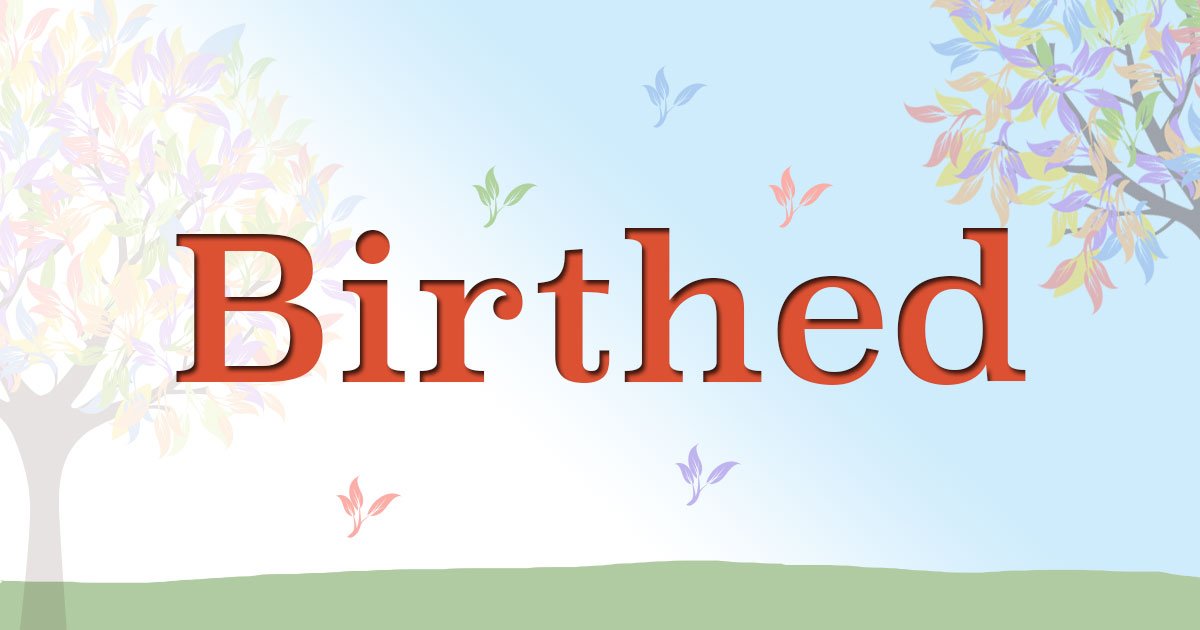
During these weeks of Advent, I’m thrilled to offer you the voices of some articulate storytellers— storytellers with wisdom to share about how their experiences of pain or loss is birthing in them something beautiful. Not in a Pollyanna sort of way of course, but in the spirit of what Leonard Cohen once wrote: “There is a crack in everything. That’s how the light gets in.”
Isn’t Advent is all about light shinning in the darkness?
I'm thankful for last week's post from Meredith Holladay. Today my friend Mary Wright Baylor-- who I met on twitter several years ago and recently discovered we were not to distant neighbors (how fun!)-- shares her poignant story of waiting in hope for better days to come.
--------------------------
Of all the seasons, fall is my least favorite.
With a July birthday, I adore summer.
I love the hot sun and heat, outdoor concerts, and fresh herbs in the garden.
As a child, I spent hours in the pool or ocean waves; I relished the freedom of summer and dreaded the return to wearing shoes and homework.
Later, as a young mother, the start of school continued to be a challenge; I missed my children and resisted the structure of homework and afterschool activities.
As a gardener, I find it melancholy to witness the end of the growing season, the harvest of flowers and herbs, the dropping leaves, and frostbitten blossoms. The shorter days and longer nights of fall take its toll on my energy and mood.
So, it was in this season in 2009, that I received a phone call that forever changed my life.
My sister-in-law called to tell me that her husband-my younger brother and the father of four-had tragically ended his own life. Totally devastated, I was overwhelmed to also hear “We need you to go tell your mom and dad.”
“Dear God in Heaven, how can I do that?”
I panicked that this shocking news would kill my elderly parents.
How could I ever tell my father, already frail from Parkinson’s disease and my mother, weakened by heart ailments, that their oldest son had died by his own means?
As darkness fell that September day, my husband drove me over to my childhood home.
I fervently prayed for God to be present, to give me strength, and to give me the language to break such horrific news. In reflection, I really don’t remember much of what happened the rest of that horrible night. Somehow, we managed our raw anguish and survived his memorial service. As we departed the church, I remember that the trees were turning color and the skies were filled with birds migrating.
Following this heart wrenching death, my father was markedly weaker and his Parkinson’s disease worsened.
In October, he was hospitalized twice for respiratory complications. As the daylight hours grew ever shorter, it was clear that his time with us was also drawing nigh.
On Christmas Eve, right after awakening from a nap, he suddenly stopped breathing. He could not be revived. With Christmas carols playing on the radio by his bedside, we surrounded our precious dad resting in peace.
Two deaths in three months. “Oh, God, give me strength! I cannot do this!” But somehow, I did.
On a frigid cold day in early January, I held my mother closely as the wind whipped in our faces and my father’s ashes were interred next to my brother’s.
My memories of the next couple of years are a gray blur.
Though working as a parish nurse, I focused all my energy on my mother. Always incredibly resilient and fortified by her deep faith, she was determined to live as fully as she could.
She continued to volunteer at church, to host family gatherings for holidays, and to join me on many outings. I remember taking her on a late summer day trip to the country. We commented that the fields of corn were drying up at the end of the season. Shortly after that, in early fall, her heart began to fail. As the days shortened and nights grew long, we took multiple trips to the emergency room. Hospitalizations kept me at her side. Though debilitated and homebound, my mother still enjoyed visits from her friends and delighted in time with my grown children. She was elated to learn that my oldest daughter, after several miscarriages, was nearing the end of her first trimester.
As fall progressed, my mother’s decline was marked and soon she was ready for home hospice care.
On a crystal clear November 14, while my remaining two brothers and I held her hands and sang “Amazing Grace,” my mother died very peacefully in her own bed.
With her death, my brothers and I had lost half of our family in three years. “Oh, God, what more do we have to endure?” How could we possibly write another obituary or plan another memorial service?
I was physically exhausted from caregiving for so long. But again, somehow, we found strength and we rallied. The date of her funeral was scheduled for the first Saturday in December on the first weekend of Advent. We thought our mother who loved the rituals of Advent would like that.
On the day before my mother’s service, my pregnant daughter called in great distress.
She had just left a routine ultrasound in which it was discovered that her baby had died in utero. I spent that day, waiting with my son-in-law in the lobby of the hospital as our dreams of our small bundle of new life ended. “How long, oh Lord, how long???”
I remember the dark, bitter cold of that winter. Numbness alternated with despair. How would I ever feel normal again?
Would I ever experience joy? How could I resume “life?” In the months that followed, I simply put one foot in front of the other. I struggled with my faith. “God, where are you?”
I didn’t know what to do other than to heed the psalmist and “to lift up mine eyes unto the hills.” Seasons passed.
And then, slowly and subtly, when I looked up, I began to notice. I noticed glorious sunsets and shooting stars. I heard the beating of a hummingbird hovering over flower blossoms.
I savored fresh basil and inhaled the fragrance of lavender in my garden.
God WAS present.
There was no Hallelujah chorus or trumpet tune. But there were clear signs of God’s omnipresence. By witnessing God at work, I began to heal. Indeed, I began to treasure time with friends and trips with my loving husband. I savored outdoor concerts in the summer and felt peace as waves lapped on the beach.
In this autumn of 2016, I was energized by clearing the bedraggled garden beds and making plans for new gardens next spring.
Perhaps for the first time, I thought that the changing tree colors were particularly vivid and brilliant. Walking our dogs in warm sun and then snuggling by a fire in the evening was cozy. Almost imperceptibly, I recognized that I was not dreading the pending anniversary dates of my family members’ deaths—rather, I felt a sense of peace and serenity.
With a distinct sense of God’s presence, I was not the least bit surprised when on the 4th anniversary of my mother’s death, on November 14, my daughter gave birth to a healthy little girl.
As my tiny granddaughter sleeps, I notice the rhythm of her breathing and feel the fuzz on her little head.
This is Advent. I know that God IS always present. Our cries ARE heard and they ARE answered. And as we are promised, new life WILL come.
After an incredibly fulfilling career in multiple roles and settings in nursing, Mary recently retired (again) as the pastoral care nurse at the Washington National Cathedral. Her “serious” time is spent in volunteering with her alma mater, University of Virginia School of Nursing and Moms Demand Action for Gun Sense in America. Mostly, though, she savors the role of grandmother and dachshund “mom.” An avid gardener, yogi, and social media, she eagerly awaits the retirement of her husband at the end of 2016.
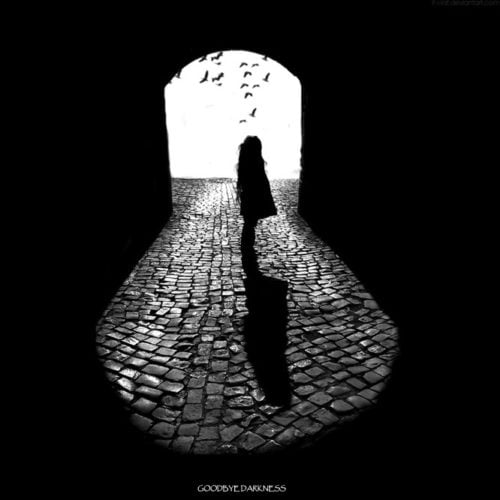
These feel like dark times, don't they?
I feel like the world in which I called to minister changed dramatically post 11/8.
No matter who you voted for President. No matter if you were happy with the results. No matter if you were deeply troubled. No matter what. The world felt different. The way we related to one felt harsher.
Going on Facebook felt like a battleground. Opening up twitter felt like war. Opening up your mouth at work about your feelings felt close to impossible.
"You voted for ___? Really? How could you?" has become a point of conversation among us. Sometimes we just don't want to know the answers.
I've heard how family members have stopped talking to family members.
I've wept over stories like this one as acts of bullying has increased.
I've talked with friends about how they are now deeply afraid for their internationally adopted children's citizenship status.
I've ached with some of our babysitters about how their family member worry they might be asked to leave the country soon or not have access to healthcare anymore.
I've heard from pastor friends all over the country who are now getting frequent calls about whether or not their congregation will be a safe space of refuge if situations call for it.
These are dark times for those of us who are so passionate about inclusion, multiculturalism, and uplifting the cause of the marginalized.
These are dark times for those of us who want harmony, peace, and good feelings throughout our land.
These are dark times for those of who plan to sit next week at Thanksgiving tables alongside folks who are hostile toward any viewpoint that isn't theirs.
So with this brand new day in America, how are we going to get through it?
This week, my book, Birthed: Finding Grace Through Infertility is launching over at Chalice Press.
When people ask me what's it's about, I say it's a story of how I got through a dark time in my own life.
I say it's a memoir of how I got from point A to point B when the worst case scenario happened to me in my dream of motherhood.
I say it's my offering to others walking in similar shoes of grief, pain and loss, infertile or not.
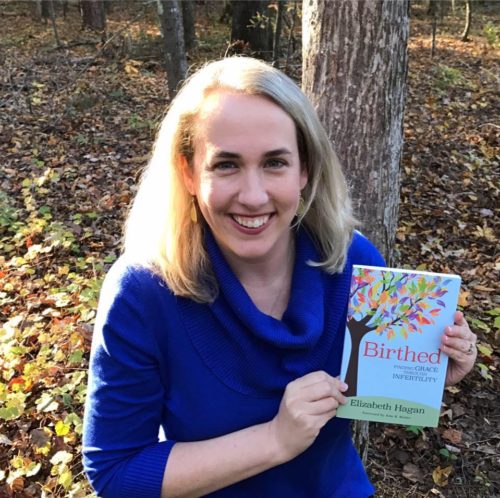 I learned so much from our long season of infertility. I believe I gained some wisdom that I could have gotten in no other season of life. At the very least, I gained some survival tips.
I learned so much from our long season of infertility. I believe I gained some wisdom that I could have gotten in no other season of life. At the very least, I gained some survival tips.
Here are three I'd like to share for those of you despairing today:
These suggestions might just be drops in the bucket. But somehow, someway you and I have to move from where we are to somewhere better.
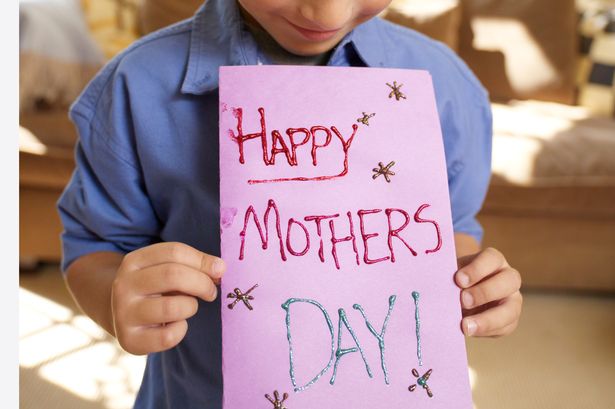 As many of you know, I've written a book about my journey as both a pastor and a person who's struggled with infertility due out with Chalice Press in October (so exciting!). And so with this true as you might imagine . . .
As many of you know, I've written a book about my journey as both a pastor and a person who's struggled with infertility due out with Chalice Press in October (so exciting!). And so with this true as you might imagine . . .
In these years of struggle I've thought a lot about what the church does wrong, what it can do better, and how I might be a voice to help the church be a place that is more inclusive for all women.
So, this week I contributed a post over at Patheos (a fabulous site for conversations in progressive theology) called "5 Ways the Church Hurts On Mother's Day" Here's a teaser.
Mothers Day. In many churches its celebrated as a church holiday when Pentecost, Trinity, or All Saints Day are not. In some, it’s the second highest attendance Sunday after Easter (I know it was in the churches I’ve pastored!). On May 8th, it will be rare that you don’t find a bulletin cover with the title “Mother’s Day” printed on the front.
Oh, how we love the day! In fact, so many churches have Mother’s Day routines executed with robot-like procession. Few can imagine doing it any other way.
But in this high exalted practice of Mother’s Day celebrated in churches of all sizes and flavors, I believe hurt occurs. Hurt occurs in practices like these 5 common Mother’s Day observances . . . You can read the rest by clicking here.
I've also contributed a post over at Project Pomegranate. This is a ministry that provides non-directive, spiritual resources about infertility, pregnancy loss, and infant death to individuals and their faith communities through its blog, books and other resources. You can find them on Facebook.
My post is called, "A Long Labor" a personal reflection about what it means to labor through infertility, though in the end the work might not result in a typical pregnancy. Here's part of the story.
I have been in labor for almost eight years. There have been ultrasounds. There has been blood work. There has been pain: both physical and emotional.
I feel called to motherhood. It’s as strong as the calling I felt to ordination almost ten years ago. It’s as strong as the calling that I felt to marry over eight years ago. But, I am still a childless mother in the the way most mothers are recognized. My bio below lists no children in our immediate family.
When I first began the journey toward motherhood, I was naïve.
After being married a year, I thought we’d start trying to have kids and then nine months later pop out a beautiful baby. I saw so many of my friends become mothers so easily. My mind and body felt strong. I saw no groaning up ahead. Why would childbirth not happen easily for me? You can read the rest here.
Also check out this post from my friend and fellow clergy colleague, Renee Kenley Purtlebaugh about her long season of grief. She has a great story to tell too.
I'm thankful for these ministry partners helping to tell stories so the silent journey of infertility is silent no more.
Most of all this weekend, I'll be reminded of these truths:
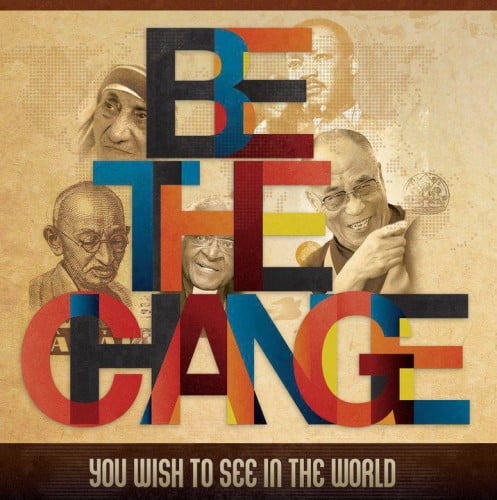 Gandhi once said, "Be the change you wish to see in the world!"
Gandhi once said, "Be the change you wish to see in the world!"
And, truly, God bless the fixers in this world because there are so many big problems out there that need solving.
There are children who need to be feed-- if only someone will figure out the resources of how to get them food.
There are elderly who are literally dying to know that somebody cares about them-- if only someone could motivate those of us with extra time to be moved in their direction.
There are diseases in certain parts of the world that could be prevented-- if only someone could move better medical care in their direction.
What about those problems that though we put all our might, all our effort, all our prayers toward, nothing seems to change?
What do we do then?
Such is a terrible plight for the best fixers among us.
I write this because I often try to be a fixer. And I know the pain of delayed expectations. The pain of knowing that as much as I want to fix something for myself or for someone I care about-- I can't.
We all hate this hard truth of life: we're not in control.
As much as I want to, I can't make a job to come out of thin air for my unemployed friend.
I can't take way the cancer diagnoses for that 12-year-old girl who I adore!
I can't re-write laws in countries which are unjust, keeping essential resources away from the most vulnerable who need them the most.
I can't spark joy into the lives of my friends who are weighed down in a season of life of funeral after funeral.
I can't. And it's so frustrating!
But what I can do is be is right where I am. I can be right where my loved ones are. I can stand with them in the midst of our unknowing. I can sit with my grief and theirs too, if I'm invited.
And I can live with the discomfort-- not run from it.
Yet, it's so easy for a "fix it" mentality to set in, though. Before we know it, we're saying:
"Oh, let's find a 3rd opinion and a 4th for that timeline of death"
"Oh, let's send out twenty more resumes and re-write 20 more versions of your cover letter."
"Oh, let's fill up the days with appointments and evenings with parties-- all of my time should be filled!"
For I believe that God calls us to live with our discomfort.
Not as punishment. Not as a fear producing exercise. But as an expression of our faith.
Because sometimes, the BEST things happen when we have no idea where we are or where we're going next. And as we give our pain time to move through us.
One of my favorite scriptures comes from Exodus 14. Moses and the Israelites found themselves at a pretty desperate place too.
They'd only just left Egypt after 400 years of slavery and Pharoah was on their tail. Moses felt beside himself in worry with so much responsiblity on his shoulders. He could not see a way forward! And, he cries out to God for help.
Or in other words, "Live with the discomfort, Moses! And let Me be in charge."
So wherever you find yourself today, hear me preaching to me and preaching to you: help is always on the way! This trust is what faith is all about.
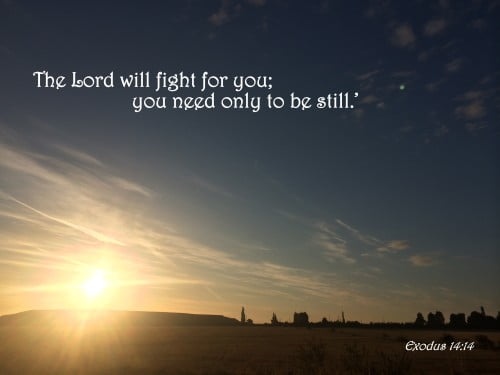
A sermon preached at the Martin Luther King, Jr. Christian Church, Reston, VA
on the occasion of Rev. Dr. Jean Robinson-Casey's anniversary as pastor 1 Samuel 15:34-16:13
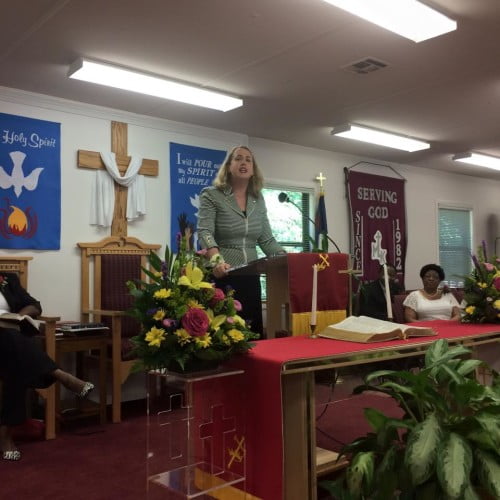 A kindergarten teacher gave her class a “show and tell” assignment. She said: bring something to school tomorrow that represents your religion.
A kindergarten teacher gave her class a “show and tell” assignment. She said: bring something to school tomorrow that represents your religion.
The first child got in front of the class and said, “My name is Benjamin and I am Jewish and this is the Star of David.”
The second child got in front of her class and said, “My name is Mary, I am Catholic and this is the Crucifix.”
The third child got up in front of his class and said, “My name is Tommy and I am Baptist and this is a casserole.”
And it’s true, when it comes to death, we know how to make a good casserole (and not just the Baptists).
We also know how to visit funeral homes and even write sympathy cards.
But, when days turn into weeks and weeks turn into months after someone’s beloved has passed what do we do?
Usually nothing.
But I believe our Jewish brothers and sisters have it going on when it comes to grief. Have you ever grieved alongside a Jewish family?
One of my favorite practices of a Jewish season of grief is called Shiva.
Shiva is the 7-day time period after the loved one dies when the family and friends gather on a nightly basis at home usually with the Rabbi to say prayers and remember the life of their beloved. Night after night after night. For seven whole days (and sometimes beyond).
During the Shiva period, mourners also do not participate in parties, concerts, TV, movies, or similar events that are celebratory in nature. Those who visit the house in mourning pay their respects by sitting on low stools or even on the floor. Mirrors are covered throughout the house. And often the mourner wears a torn black ribbon on their clothes as a sign that the loss of the loved one has torn a piece of their hearts. Candles are burned.
Then at exactly a year after the passing of the loved one another special ceremony is held to mark the end of the life again. In my opinion, these are some beautiful rituals!
But no matter how long we grieve or don’t grieve for the losses in our life, if we’re Christian, Jewish or Muslim, there’s always an expectation of an expiration date for grief no matter the culture. Isn’t there?
But often our grief has a life cycle of its own.
I don’t want to be the pastor this morning that tells you not to grieve, not to pour out your heart to God when the situation asks for it.
I don’t want to be the pastor who tells you to have any shame when life hits you with an unbearable loss.
I don’t want to be the pastor who says don’t cry if you need to, even in public (which I have to tell you my husband, Kevin hates when I cry in public because he always says people are then looking at him, thinking that it’s his fault when it’s not).
No, this morning, I don’t want to be anti-grief at all.
But I am going to ask you this morning this one question, “How long will you grieve?”
How long?
This morning, in our Old Testament lesson, we encounter two powerful leaders transitioning toward how the promptings of God’s leadings. And one was asked the question, “How long will you grieve?”
One man was priest in chief in all the land. The other man was the king. The king is told by the priest that he would soon no longer be king. The king doesn’t like this news (of course). And the priest doesn’t like giving it. But this does not change the facts.
Grief enters the picture.
But the Lord says the priest struggling with the change, “How long will you grieve?”
How long?
Let’s talk more about WHO these two men are.
First, there’s Samuel, the priest. He’s an honorable man before God whose calling came even before he was born!
His mother Hannah prayed so hard for him that when onlookers saw her in the temple crying out to God they assumed she was drunk. But thanks to Hannah’s prayers and the Lord’s hand on his life, Samuel listened rightly from a young age.
Remember his famous call story? Samuel lives in the temple of the Lord alongside the high priest at the time, Eli.
One night Samuel hears the voice of something calling. It comes not once, not twice but three times. And Eli tells him when he heard the third time to say, “Speak, Lord for your servant is listening.”
And from this point on, as Samuel began to play a major role in the spiritual life of the nation of Israel: he was God’s mouthpiece.
As the people cried out to be a nation “like everyone else” and not be ruled by judges but by kings, it was Samuel’s role to anoint the first king of the land.
This brings us to our second character of the day, Saul. Scripture tells us that he’s good looking and a head taller than everyone else. And of course being tall and handsome makes for a great leader, right?
But, Saul was from the tribe of Benjamin, the smallest and least important tribe of the nation—so still unlikely choice when picking kings if it came down to a popularity contest. But back in chapter 9 of the book of I Samuel, we learn, though, that Saul is God’s man. At age 30, he descends the throne. The very first king in all of Israel!
And Saul’s a good king until . . . he stops listening to the One who put him on the throne. He becomes more afraid of what the people say about him rather than God. He can no longer be trusted to do as God asks him to do. According to God, Saul must go. Samuel needs to break the news to him.
Can you imagine what this meeting of “You’re fired!” felt like, especially for Samuel?
For, Samuel had invested so much of himself in Saul.
Samuel was Saul’s go to advisor, teacher and trainer.
Samuel had laid aside his ego so that Saul could do his thing and shine.
And now it seemed like all of this hard work was for nothing! A dream cut short.
If we go back a couple of verses, we learn that when Samuel first hears this news from the Lord, he “was troubled and called out to the Lord all that night.”
If that is not a picture of grief, I don’t know what is! For we see Samuel:
Crying out.
Not sleeping.
Counting the minutes on the clock till morning.
(And we’ve all been there too).
But as time passes, the Lord comes to Samuel again and says: “How long will you grieve?”
How long?
I want to stop right here and check in with what I think some of you might be wondering about your preacher this morning:
“Don’t I know what Sunday this is? Don’t I know what occasion I came for? Did I get confused? Don’t I know that a Pastor’s anniversary service is supposed to be about celebration, not all this depressing talk about grief?”
Yes, I know. And I know that you love your dear Pastor Jean and Clyde. And I love them too. And I’m so glad you set this day aside every year to celebrate their ministry among you.
It’s a word that asks us about all the places in our lives where we are stuck.
It’s a word that asks us where we’ve been paralyzed by the vision that we have for our lives that's not working out.
It’s a word that moves us to action: to lay down the losses that we can’t just seem to get over SO that God’s fresh new wind can blow it’s way through us again.
I don’t know about you, but if I were to make a list of the grief like this, the list would be long.
All of this is leads to grief my friend. Real grief.
And as a church family we’ve got our grief lists too.
And to this, the Lord says, “How long will you grief?”
How long?
I guess, church, we all have a choice.
The Lord says to us, fine. Have your grief if you want it. Have your sleepless nights if you want it. Have your vision of your life if you want it.
But if you are ready for something better, then grieve no more. Let what is dead be dead.
The morning has broken. A new day is here. Open your eyes to see it.
Consider what happened next with our guy, Samuel. As we go back to I Samuel 16 new possibilities come into Samuel’s view.
 From God, Samuel receives specific instructions on how to proceed. He’s told to go to Bethlehem. He’s told find the sons of Jesse. He’s told that when he reaches the village, he’ll know which one of the young men will be the next leader.
From God, Samuel receives specific instructions on how to proceed. He’s told to go to Bethlehem. He’s told find the sons of Jesse. He’s told that when he reaches the village, he’ll know which one of the young men will be the next leader.
Samuel is confused (as we often are) but he’s attentive to the voice of the Spirit. He listens! And the most unexpected leader emerges.
David, who is young, small and most certainly NOT ready for a gig on the national stage is presented last.
Samuel hears this: “The Lord does not look at the things man looks at. Man looks at the outward appearance but the Lord looks at the heart.”
Get your head out of the rear view mirror and look up ahead. See I am doing a new thing, do you not see it?
How long will you grieve, Samuel?
How long?
I once heard a story from one of my colleagues about a young couple that attended his congregation.
This couple, I learned from my pastor friend were so in love when he married them, so compatible, so full of great plans for their future of children, vacations and the young wife even wrote a plan for how they’d celebrate the best holiday traditions while they were still engaged.
But, then 2 months into their fairytale like marriage the husband was driving home from work and was instantly killed one evening by a tracker trailer.
You look up the word “unfair” in the dictionary and there should be a reference to the newspaper story about this day. Car accidents should never happen. And the most certainly should not happen to bright 20 somethings.
My pastor friend went on to tell me more about this widow. How she began a daily ritual a couple of days after the funeral.
Every morning, she’d go to graveside, take her coffee and read aloud from one of her devotional books or other literature she liked.
When anyone asked why she did this, the widow would always answer, “Because it’s how I feel close to him.”
We want to say awww don’t we? It’s a beautiful expression of the timeless bonds of love, isn’t it?
But then when I asked my pastor friend what I thought was a basic question, “How long ago since this husband died?” the pastor said to me, “The wreck was 23 years ago!"
I gasped. The pastor went on: "Though she gets regular invitations to re-imagine her life with new friends, new activities and even new romantic partners, this woman will not stop grieving. She won’t stop going to the grave every morning.”
We’ve also gotten stuck on what we hoped our family would be! We too have gotten stuck on what we wished our career could be! We’ve gotten stuck on what somebody else said our church should be by now!
And in our grief, we’ve forgotten the resurrection power of our Lord. We’ve forgotten to dream a dream and live into something new, the new that our all-knowing Lord has prepared for us all along.
So church, do you want to move into the new?
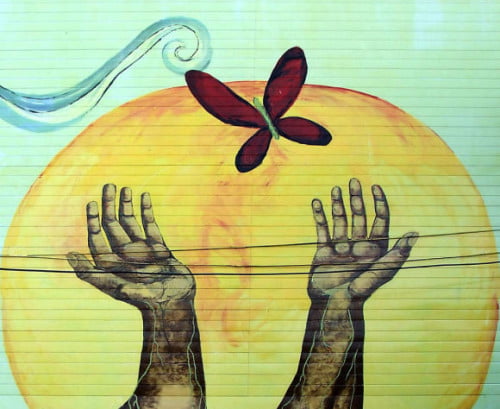 I can’t think of any better way on this anniversary of your pastors, than to commit to yourself this morning to grieve no more on what the Martin Luther King, Jr. Christian Church is not.
I can’t think of any better way on this anniversary of your pastors, than to commit to yourself this morning to grieve no more on what the Martin Luther King, Jr. Christian Church is not.
I can’t think of any better way to live into where Pastor Jean and Clyde are leading you in the future than to lay aside the losses of the past.
I can’t think of any better way to be good stewards of the ministry that God has given you in this place than to mark this day, to mark this day as the day when you grieved no more.
To claim this is a day when you said to Jesus, “I am going to trust you.”
“I am going to follow you.”
“I am going to step out on faith with you . . . even if what I really want to do is run for the covers at in bed at home.”
And most of all: “I am going to grieve for the past no more. I am going to say yes, Lord. Yes, Lord to what you have for me.”
So, church, how long will you grieve?
Let's leave the tombs and follow our resurrected Lord.
AMEN
This is the second part in a series. If you missed the first entry begin by reading here.
It all started on Easter Sunday morning-- the most joyous day of the Christian year and I was not excited about getting out of bed.
It took Kevin almost an hour to move me.
The problem was that I didn't want to go to church even though I knew we'd be attending the services of a dear pastor friend.
I didn't want to be around happy clappy Christians. I did not want to be forced to say "Christ is Risen Indeed!" with a smile on my face.
And though such sentiments went against what I wrote in my "If I were Preaching Easter" previous blog post. It just was where I was. I am just not in a season of life of Easter. Good Friday or Holy Saturday might be more like it.
And I realized in that moment that I was not that kind of Christian (even if it is what my friends or husband or colleagues want me to be).
I can't pretend.
I'm not a "let the injustices of this world or of my own heart roll off my back" sort of Christian. And I am most certainly not an "everything happens for a reason" sort of Christian. And it really annoys me when others try to belittle my pain by offering such platitudes.
Though I have such amazing Jesus loving friends with lighthearted outlook on life, I'm simply not that kind of Christian.
I'm not a Christian that can be encouraged by, "God works all things together for the good" (because sometimes that good may not come in our lifetime and it really sucks).
I'm not a Christian that believes suffering happens because "God is testing us" (because suffering often comes hand in hand with what it means to be a living breathing and walking human being).
I'm not a Christian that can go to church and eat shortbread cookies afterwards with the church folks and let sexist or racist comments pass for small talk (because if I didn't call it out-- even if it meant I wouldn't be welcome there anymore-- who would?).
BUT, I am the kind of Christian who is not going to give up. I am going to keep seeking. I am going to keep wrestling with the mystery of the Divine.
Even when nothing makes sense and I don't want to go to church, I will keep on keeping on. I will go to church like I did on Easter.
Last Sunday, passed the peace. I sang, "He Lives, He Lives." And, I shared an Easter meal afterwards with friends.
All of these, I believe are signs of resurrection, even if I didn't feel them in the moment. A spiritual mentor reminded me afterwards that Easter is a fact. It's not a feeling. So at least I observed the fact which didn't need me to feel it to be true.
Most of all I want you to know that I am the kind of Christian who is always going to tell you the truth.
And this year Easter was a lot like rotten eggs. Maybe next year will be better?
 What do you do when the unspeakable happens to those you love?
What do you do when the unspeakable happens to those you love?
A month or so ago, a dear seminary friend, Rebekah who had recently lost a baby at 20 weeks shared this list on Facebook as a way to help people know how to care (brave and awesome of her!).
It was a handout that she'd shared in an adult education class in the church she serves in New York City.
I loved the list-- not only because it helped me understand where my friend was in her journey of grief, but because it was a great conversation starter for other friends who were going through their own difficult situations.
It is so easy, even as a person who wants to have a compassionate heart to get so consumed in your own stuff. It's easy to forget the grief is long journey. It's easy to forget that a person is more than just their pain, especially when their pain so raw at a particular time. It's easy to fear saying the "wrong thing" that you end up doing nothing at all.
So, here's some suggestions for some helpful and less helpful approaches.
Four categories of how we DON’T help; what not to say to people in pain:
--The “fix it” sayings: Resist any urge to jump to a conclusion for someone; folks don’t always need a solution, it feels dismissive of their pain.
--Sayings that can dismiss pain: Any sentence that begins with “at least”, “This too shall pass”, “Everything happens for a reason”.
--Bad Theology: when in doubt, don’t open your mouth. Do not say: “Everything is meant to be or "happens for a reason”, “When God closes a door, he always opens a window”, “God doesn't give you more than you can handle”, “It was God’s will”—(don’t ever say this unless you’re God), “God needed another angel” or anything that communicates that God takes the person away.
--“I know what you’re going through”: Don’t rush to share your own experience; it can minimize the pain of someone else who needs to share their own story and feelings. Finding commonality is helpful, but sometimes folks need you to listen. Especially don’t do this if the outcome was bad: “I know of someone who had that kind of cancer and she died”
Four ways of how we CAN help:
--Ministry of presence: Being present, letting them be angry/sad, telling them that it’s not ok that this happened and you’re a safe person for them to talk to.
--Intentional listening, without judgment and without an agenda. Listen with the intention of helping them think through their decisions. Don’t try to fix their problems. Be careful of interrupting.
--Doing the practical things: laundry, food, childcare, cleaning, etc.
--Remembering that they are more than their pain. They have another identity outside of their pain—they are more than someone with cancer, more than a widow, more than someone who lost a parent, a child. Some folks don’t want to enter a conversation and have everyone be sad for them all the time. They want to move on and have another identity.
Thanks, Rebekah! What might you add to the list?
[If you missed Dayna's first post on "Waiting with Hope" check it out here]
When Elizabeth heard Mary’s greeting, the baby leaped in her womb, and Elizabeth was filled with the Holy Spirit. In a loud voice she exclaimed: “Blessed are you among women, and blessed is the child you will bear! But why am I so favored, that the mother of my Lord should come to me? As soon as the sound of your greeting reached my ears, the baby in my womb leaped for joy. Blessed is she who has believed that the Lord would fulfill his promises to her!
Luke 1:41- 45
The story of God’s redemption is full of babies - longed for babies, unexpected babies, babies born to women long past the age of fertility, babies that no one could ever have predicted. These babies are almost always a source of delight and joy. Their births are a sign to their parents and their community of God’s presence among them, making something out of nothing. Over and over again God creates ex nihilo – out of nothing – in the wombs of Israel’s women.
And yet, the lives of these babies are not charmed – or even protected – in the ways we would hope or expect. John the Baptist, who leapt in Elizabeth’s womb in response to Mary’s greeting, grew up to be a prophet who was imprisoned and then beheaded by Herod. Jesus’ birth forced Mary and Joseph to become refugees in Egypt. His life ended with torture and execution, while his mother looked on helplessly. Many of the boys born at the same time as these cousins were slaughtered by Herod before their second birthdays.
It’s a story filled with joy, but also a story of some of the deepest pain imaginable, a story almost too horrible in places to tell. It’s a story of desperate parents, of shattering grief, of empty arms. Each of those lives was a gift, a delight, a blessing, a sign of God’s miraculous power to breathe life into human flesh over and over again. And yet, each child was radically vulnerable to the life-crushing powers of suffering and death.
Soon after my husband and I learned that the baby we were expecting had a fatal birth defect (See Dec 6 Post), I discovered a website devoted to telling the stories of families who had welcomed a child with a poor prenatal diagnosis (BeNotAfraid.net). The diagnoses and stories of these families were all different – some children fared far better than expected, while others died before or shortly after birth. Some have thrived and flourished, while others live with disabilities that cause them pain or that will eventually take their lives. But the thread that ran through all the stories was the joy these parents found in their children’s lives. Despite the pain of loving a child with a severe disability, every parent was deeply grateful for the gift of their child’s life.
It seemed very strange to find joy in the life of a child who was not yet born and already dying. How could the life of a dying child be a sign of God’s presence and blessing? How could a child whose body was so profoundly disfigured and disabled be a gift from God? How could we find joy in welcoming a child who would never gain consciousness?
Over the remaining months of my pregnancy with Ethan, I learned this: in order to receive the joy of Ethan’s life, of being his parents, we had to open ourselves to the grief of lamenting his loss. The deeper the joy we took in his life, the deeper the pain of losing him. The more we embraced the hard work of grieving his coming loss, the more we were able to receive the gifts of being his parents and taking joy in his life.
Knowing that his life would be short caused us to slow down and pay attention in ways that we might otherwise never have done. My husband and I spent time each day listening to our son’s heartbeat on a fetal Doppler. We read to him and sang to him and told him the story of our love for him. Even as I grieved, I paused to enjoy my son’s kicks and thumps inside my womb.
What I learned from welcoming Ethan into my life is this: joy is different from happiness. Joy can see and celebrate what is a gift from God in the midst of what is almost unbearable. Joy doesn’t deny or overlook what is painful and grief-filled, but it refuses to let the pain cancel out what is good and beautiful. Joy insists that God is present even in the midst of darkness and death.
Let us pray:
Come Lord Jesus. Give us the strength to welcome your life-giving presence in the midst of darkness and grief. Amen.
Dayna is a member of Durham Mennonite Church (Mennonite Church USA) and part of the Rutba House new monastic community. She and her husband Eric live in the Walltown neighborhood of Durham, NC and are parents of one living son, Noah. Their firstborn son, Ethan, was born and died in 2009. Dayna is hoping this Advent for a heart open to God’s longings for the most vulnerable among us.
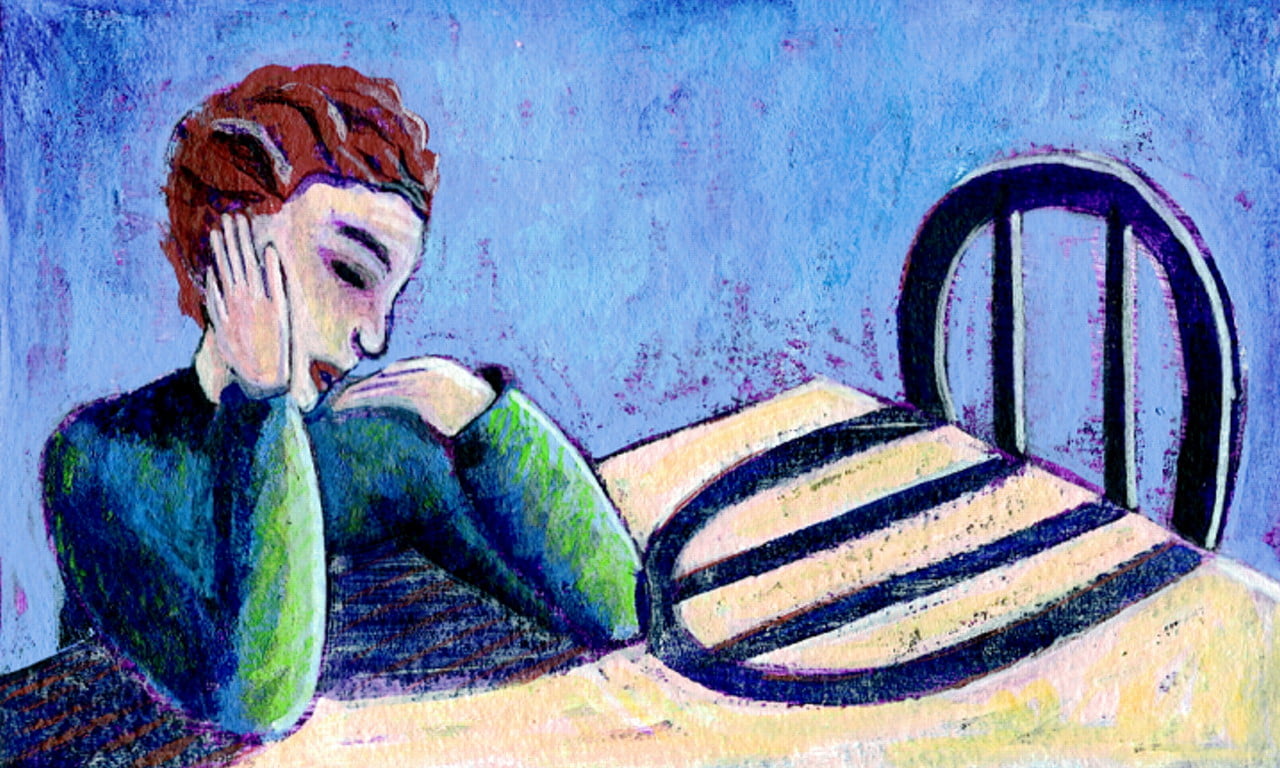 What do you say when a person is going through the deep woes of grief?
What do you say when a person is going through the deep woes of grief?
What do you do when there are no words to make it better?
How do you respond a situation so intensely sad and unexpected that you can't even wrap your mind around it?
Many of us just don't know what to do.
A friend of mine recently lost her life partner to cancer. Another sad story about the way that life just should not be. In the past couple of months, this friend has kept several of us up to date through emails about how she is doing, what she's been thinking about, and what has brought her comfort. I've really appreciated this way to connect with her, especially considering the authenticity in which she's faced her deep sadness-- including those of us who love her in her process as much as she is able.
And today my friend forwarded to me "This is how I feel" list that she received from participating in a recent grief workshop. She said it expressed beautifully what she felt. As someone who has also been through long periods of grief too, I know so many of these suggestions to be helpful ones-- ones I wished I'd been able to share at the time with those who wanted to "help" me but just didn't know what to do. So I could not help but share it here:
Please be patient with me; I need to grieve in my own way and in my own time.
Please don't take away my grief or try to fix my pain. The best thing you can do is listen to me and let me cry on our shoulder. Don't be afraid to cry with me. Your tears will tell me how much you care.
Please forgive me if I seem insensitive to your problems. I feel depleted and drained, like an empty vessel, with nothing left to give.
Please let me express my feelings and talk about my memories. Feel free to share your own stories of my loved one with me. I need to hear them.
Please understand why I must turn a deaf ear to criticism or tired clichés. I can't handle another person telling me that time heals all wounds.
Please don't try to find the "right" words to say to me. There's nothing you can say to take away the hurt. What I need are hugs, not words.
Please don't push me to do things I'm not ready to do, or feel hurt if I seem withdrawn. This is a necessary part of my recovery.
Please don't stop calling me. You might think you're respecting my privacy, but to me it feels like abandonment. Please don't expect me to be the same as I was before. I've been through a traumatic experience and I'm a different person.
Please accept me for who I am today. Pray with me and for me. Should I falter in my own faith, let me lean on yours. In return for your loving support I promise that, after I've worked through my grief, I will be a more loving, caring, sensitive, and compassionate friend-because I have learned from the best.
Is there anything you'd add?
November 18, 2012
Dear Washington Plaza Church family:
I come before you this morning with a heavy heart. It’s heavy because I have news to share with you that has caused me a great deal of sadness as I have thought and prayed and discerned. I need to tell you that I am sharing this resignation letter today, ending this chapter as your pastor effective on December 24, 2012.
This is sad news for all of us because we have loved each other well over these four years of life together as pastor and congregation. And, when you love someone, you don’t ever want to part ways. When you love someone, you don’t want to do anything to hurt them, to discourage them, or to cause them pain. The deep love I have for you has made this decision a particularly hard one.
But in spiritual community, which is what we’ve formed together as a church, there is something in addition to love for one another that binds us together, and that is calling. We believe that God ordains and guides all of our steps, even when what we are being asked to do is difficult. My change in status with you is a response to my changing sense of call.
It is not that I have been called to be a pastor of another church.
It is not that I haven’t enjoyed being your pastor or that there is some conflict going on in the church that you don’t know about.
It is not that I have lost my faith in anyway or am leaving the ministry. Rather, it is that I feel called into a different season of ministry beginning in 2013.
As you all know, Kevin’s new position as President of Feed The Children has caused a huge shift in our life rhythms in 2012. This new assignment came about as a result of God’s calling on Kevin’s life to lead and as he has settled into his responsibilities a shift has happened within me as well. I, too, now feel a call to use the voice God has given me to be a global advocate for children and families, for those most often ignored or in distress. I will begin to volunteer more of my time to FTC. And I look forward to spending more time with my husband in the coming months.
In addition, I believe God is leading me to grow into my writing vocation—completing a book for publication by the end of next year and pursuing new writing projects.
So, while my time as your pastor will come to an end this year know of my ongoing love and support for you as a church. I believe as strongly in the vision of who you are as a congregation as I did when I began in January 2009. You are unique in the best of ways. You are a needed witness in this community of God’s acceptance for all people. You are a collection of some of the kindest and most loving people that any pastor could hope to lead.
You have certainly moved mountains in my own life—you have made me into the woman, the pastor that I am today and will be in the future. You took a chance on hiring a 28 year old, who could have been your granddaughter, making her YOUR pastor.
By doing this for me four years ago, you gave me the biggest gifts and honors of my life—to be called your pastor. And our relationship, you have given me room to grow and explore and find my voice and for that I am and will forever be grateful.
It’s a time in our history with one another to be sad. It’s a time to walk through grief. But it is also a time to trust. You are so much bigger than who your pastor is. You are so much more than your leader. You are strong and capable of being all that God calls you to in the future.
I know this time of transition will have its own unique challenges, but believe you will face them with same grace and perseverance you have shown in facing challenges before. I will be cheering you on, treasuring the memories made in our four years together, and wishing you all of God’s most abundant blessings in your future.
With love,
Elizabeth
Yesterday I preached on I Samuel 15:34-16:13, and though I thought I would be writing a sermon about God's unlikely choices this ended up being a sermon about grief. Surprised me for sure! I just couldn't seem to get the "How long will you grief for Saul?" verse out of my mind as I prepared. So, I just went with it and here's a portion of it:
 When is the last time you truly grieved over something? I mean a good long cry, a into the night cry, into the next day cry that you thought that you never would get over?
When is the last time you truly grieved over something? I mean a good long cry, a into the night cry, into the next day cry that you thought that you never would get over?
I remember the spring when my grandmother died. Gran, who had played a central role in my upbringing and joy in my childhood, died as when I was in my second semester of seminary. Gran was more than just a grandmother via biological connections, she was a friend, a confidant, someone in whom I talked my problems over with regularly. She made me feel special always in a way that others did not. When she died, the loss stung deep. It ached. It made me feel like there was no reason in the morning to get out of bed-- though trust me, there was plenty of papers calling my name to write! But, I couldn't seem to get over it as much as I tried.
Anne Lamott in her book Operating Instructions writes about the first year of her son's life the experience of getting used to motherhood but at the same time grieving the death of one of her closest friends saying, "And I felt like my heart had been so thoroughly and irreparably broken that there could be no real joy again, that at best there might eventually be a little contentment. Everyone wanted me to get help and rejoin life, pick up the pieces and move on, and I tried to, I wanted to, but I just had to lie in the mud with my arms wrapped around myself, eyes closed, grieving, until I didn’t have to anymore.”
Sometimes as much as we want to get over the loss of someone or something, we simply can't. Our grief grips us and becoming the central story of our lives to the pint in which we simply can't even comprehend seeing past our own circumstances.
Grief, as many of you know, especially those of you who have studied it in workshops and other seminars, is not always about loss via death. Grief over the loss of careers, aspirations or relationship which used to be close but are no longer can paralyze us as deeply as any physical death can. To wake up one morning and find that what you thought was your life work is destroyed by the rejection of others, to come to terms with your best friend no longer is speaking to you, or be let in on a truth about our family after years of secrecy, we can feel smacked in the face. Grief seeks to holding us down for as long as possible. Grief, if we don't find a way to move through it can destroy our lives.
In our Old Testament lesson for this morning, we meet the prophet Samuel again.
Called out as the great prophet of Israel, called out as young boy to be the saving grace leader of a nation in deep decline, called out as the one who would be God's spokesperson to a people desperate to hear a good word-- Samuel was on top of the world. Things were going great! Samuel was the hope of the nation, after all. Yet, in this state of extreme responsibility, I can imagine that Samuel felt he needed to make just the right choices at just the right time so to ensure that the nation of Israel had a future. And for a while, it seemed Samuel tasted the sweet fruit of his good, seemingly God led choices.
So, what happens when all goes badly? What happens when the king HE anoints behaves badly and needs to be removed from office?
And it is at this juncture, we find him in a place of deep grief. All is not well in his world. Samuel blames himself. He pouts. He cries. And, see Saul's failures as a reflection of himself. How can he ever again show his face in public after Saul has flopped big time? Grief was his primary story.
And God has a word with him about it saying in 16:1: "How long will you grief over Saul?"
Or, "How long, Samuel will grief be your story?"
It is not that grieving is wrong or an inappropriate emotion, but that for every period of grief, (especially the more pity party kinds)-- there comes a time when it must end. For as spiritually cleansing and healthy as grief is, it's an emotion has a time and season. For, if one stays in a grieving process too long, past its time-- it can actually be destructive. For Samuel, God says, it is time to move on.
Grief over what could, should, would have been and all the feelings of personal failure internalized held Samuel captive, we learn. In particular for Samuel, his grief held him captive to only what he could see, hear, and feel in the present moment. Grief stole his vision for life and the people he was entrusted to lead.
Thus, the Lord is saying to him, "You are not perfect. All is not perfect in this land. I know this. But one thing still holds true: I still love these people. I still love you. And, there is work to be done in the future!" And this is the post-grief task one that our text narrates for us, God says: "I have rejected [Saul] from being king over Israel. Fill your horn with oil and set out; I will send you to Jesse the Bethlehemite, for I have provided for myself a king among his sons."
Though Saul has been a disappointment of a king and leader and Samuel wants to keep believing that it was all his fault, such feelings just aren't helpful. In fact, God is asking him to dust his sandals off from the dirt in which he's sat and go be a part of the next great thing that God was going to do in the nation: anoint the next king.
And, it's important to note here that it would have been easy for Samuel, as he went to find the next leader, to fall into the trap that is naturally a part of being in an aggrieved state: the syndrome of "must do anything to fix the pain right now."
You've met these people if you aren't one right now: the "hurry up and get this over with" folks. Pain and its effects are despised so much that these people will do anything not to feel the pain of disappointment, rejection or loss. Things like: drinking too much wine when they get home from work, staying at the gym too long and skipping meals, or even drowning each night away in mindless tv-- just avoiding the grief through a distraction.
Or, the approach of getting to work too rapidly, taking the lead alone to solve the grief right away. Type A things like signing up for every single class or seminar known to man about a particular issue-- trying to become the expert of one's own problems. Things like making lists after lists after lists of what can be done-- trying to logically organize their way through your problems. Or even, the simple act of refusing to rest through grief-- doing, doing and more doing.
In all of this, I believe that God knew that Samuel could be in this exact place as well-- trying to avoid or solve the problem too quickly. Samuel is given exactly, then what grief needs to keep moving-- clarity. Samuel is told exactly what to do, exactly what to say, and exactly who to listen to when he arrives at the hometown of Jesse. The end of verse three gives us what is most important as a word from the LORD: "You shall anoint for me the one whom I name to you."
Specifically Samuel was told in verse 7 not to make a quick judgment just to get the process of selecting the next leader done as quickly as possible. Sa ying, to Samuel, "Do not look on his appearance or on the height of his stature, because I have rejected him; for the Lord does not see as mortals see; they look on the outward appearance but the LORD looks on the heart."
ying, to Samuel, "Do not look on his appearance or on the height of his stature, because I have rejected him; for the Lord does not see as mortals see; they look on the outward appearance but the LORD looks on the heart."
God saying, "Don't just go Samuel to who you think meets the criteria that others will approve of. Instead, listen to me. I can show you who has the heart for the work of king. Don't make this process about you. Listen."
Or simply stated, Samuel could have rushed through the line of brothers among Jesse's sons-- very easily he could have solved his failure complex quickly-- but if he did, then, he'd be missing out on an opportunity to hear God's leading.
And, thus, this is the surprise-- in Samuel's grief, in his pain, God was about to do a new thing, a new thing in the life of Israel where healing would come from the unlikely choice of youngest son David as the next king as Samuel kept listening. This was all he was asked to do.
I can remember some of the most powerful words said over me (that I obviously still remember to this day) at my ordination service. During the laying on of hands a deacon of the ordaining church came up to me and said, "Listen to God. You've gotten to this point in your life through listening and you will do great things if you keep listening."
Isn't God funny like this sometimes? We make it so difficult when all we are asked to do is to put one foot in front of the other and listen as we go. Of course this doesn't take away the pain or the loss, but we do have direction for what is next. And this can be grief's greatest surprise . . .
How else have you been surprised by grief in your life? I'd love to know!
How many times has it be said about grief: "It's not a big deal. Why can't you just get over it?" Or, "Time heals all wounds."
It is easy for us to say or want to say these words because in doing so we separate the emotion from our participation in it. Grief, when let loose is confusing. It is consuming and can be all-consuming. Grief always has a life cycle of its own. To be a friend of grief, hard work is required. And, if we are honest, often we really don't want to work this hard, especially when we see others on what looks like much easier paths. It is a lot easier to throw up our hands and say, "Life is unfair" than to do the work grief lays out for us. Grief is a messy, very messy process, no matter how trained we are in its "stages."
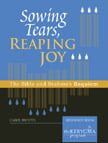 For the past two Wednesday nights, a group of us from Washington Plaza began a study called, "Sowing Tears, Reaping Joy: The Bible and Brahm's Requiem." This study involves the study of scripture texts that appear and inform the words of the requiem as well as listening to sections of the music in a reflective posture. We've also taken moments throughout the sessions to pause and share with one another our experiences of grief. Together, as a small group, we are wading in the waters of deep community. It's not easy to talk about grief, you know!
For the past two Wednesday nights, a group of us from Washington Plaza began a study called, "Sowing Tears, Reaping Joy: The Bible and Brahm's Requiem." This study involves the study of scripture texts that appear and inform the words of the requiem as well as listening to sections of the music in a reflective posture. We've also taken moments throughout the sessions to pause and share with one another our experiences of grief. Together, as a small group, we are wading in the waters of deep community. It's not easy to talk about grief, you know!
Besides observing how real and deep and experienced many in this small group are with the study of and process of grief, I've also noticed how eager each of us in the class are to sit with the depths of grief together in new ways. (What an unusual gift!)
Part of this re-examining process includes revisiting some of the great mourning texts of the scriptures. We started with some words of Jesus.
When Jesus says in his great Sermon on the Mount, "blessed are they that mourn; for they will be comforted" it seems like a completely wacky paradox, we observed. How could Jesus say such a thing? Especially to our natural human tendency to want to explain away grief with simple answers that seem to make it better as soon as possible . . . so how could we believe such? How could mourning be good for us?
While many psychological experts might jump in and answer our questions quickly, from a spiritual perspective, we've talked about grieving because we have to. In fact, our willingness to embrace grief has a lot to do with what we feel about God. Grief teaches us to sit long with such questions as: "What is God's plans for this world? How is it that we know God? Who can ultimately be trusted in the midst of our dark moments? Why do good things happen to such bad people?"
Such grief questions do not even have morsels to offer us if we don't wait. And, wait some more.
Ellen Davis, a professor of mine from seminary said this in a sermon given in 1993 at Berkeley Divinity School, about grief: "From a Biblical perspective, living well with sorrow means dwelling on it, lamenting it before God, allowing-no, committing yourself to search the sorrow, to explore every corner of it, to ransack the emptiness until it yields its treasure, the hidden blessing on those who mourn."
I can't think of a more beautiful way to describe the process of "blessed are they that mourn." For if we refuse to make a friend of grief, both within us and our immediate community, we are also going to also miss out on its great gifts. Again placing the word "grief" and "gifts" in the same sentence sounds wrong to me, doesn't it to you? But, more and more I am learning that the pain of grief is not diminished if we have open hands to what only grief can bring us: joy. Joy, yes, even in grief and all its pain, there might be joy a coming . . .
Joy in the companionship of friends who love us at our worst.
Joy in the ability to keep going when we have every reason to give up.
Joy in the knowledge that we are seen and known deeply by our Creator.
Blessed are they that mourn-- for those who cry, walling, lament, and angrily shout at God for as long as it takes to get it all out-- for in mourning space hope has a possiblity of breaking through.
Any are welcomed to join us on this grief journey for the next five Wednesday nights!